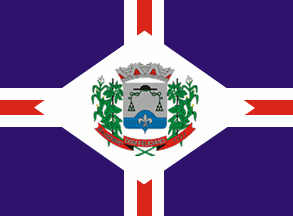 image by Dirk Schönberger,
4
February 2012
image by Dirk Schönberger,
4
February 2012Source: http://www.domfeliciano.rs.gov.br/040/04010001.asp

Last modified: 2020-07-18 by ian macdonald
Keywords: rio grande do sul | dom feliciano |
Links: FOTW homepage |
search |
disclaimer and copyright |
write us |
mirrors
 image by Dirk Schönberger,
4
February 2012
image by Dirk Schönberger,
4
February 2012
Source:
http://www.domfeliciano.rs.gov.br/040/04010001.asp
The municipality of Dom Feliciano (15,038 inhabitants in 2013; 13,562 ha) is
located 110 km of Porto Alegre.
Dom Feliciano was established in 1891 by
Polish colonists. The municipality's namesake is Feliciano José Rodrigues de
Araújo Prates (1781-1858), appointed 1st Bishop of São Pedro de Rio Grande do
Sul in 1852. After the Ragamuffin War, Feliciano served as parish priest in São
Feliciano, the 5th district of Encruzilhada (now, Encruzilhada do Sul),
subsequently emancipated as the municipality of Dom Feliciano.
https://www.domfeliciano.rs.gov.br/
Municipal website
Ivan Sache, 17July 2020
The flag and arms of Dom Feliciano are prescribed by Municipal
Law No. 254 promulgated on 26 September 1975.
Article 6.
The municipal
flag of Dom Feliciano, designed by the heraldist Arcinoé Antonio Peixoto de
Faria, shall be quartered by a cross, with blue quarters formed by white stripes
of two units in width superimposed with red stripes of one unit, arranged
horizontally and vertically and crossing in the flag's center, where they are
superimposed by a white lozenge of six units in width on eight units in length
charged with the municipal coat of arms.
§1. In compliance with the
Portuguese and heraldic traditions, and their inherited canons and rules,
municipal flags have to be divided in eight or six horizontal stripes, quartered
or divided in three parts, featuring the same colors as the field of the coat of
arms and in the center or at hoist a geometrical figure inscribing the municipal
coat of arms.
§2. The municipal flag of Dom Feliciano obeys this general
rule, being quartered by a cross symbolizing the people's Christian spirit. The
coat of arms applied on the flag represents the municipal government while the
white lozenge represents the town as the municipal seat. White is a symbol of
peace, friendship, work, property, purity and religiosity. The white stripes
charged with red stripes quartering the flag represent the spread of municipal
power all over the territory. Red is a symbol of dedication, patriotic love,
audacity, intrepidity, courage and valiance, while the blue quarters represent
the rural estates scattered over the municipal territory. Blue represents
justice, nobleness, perseverance, zeal, loyalty, recreation and beauty.
Article 7.
In compliance with heraldic rules, the municipal flag shall have
the official dimensions adopted for the national flag, 14 units in width on 20
units in length.
Article 19.
The coat of arms of Dom Feliciano,
designed by the heraldist Arcinoé Antonio Peixoto de Faria,is described as
follows:
A Samnit shield surmounted by a six-towered mural crown argent ports
gules, argent a galero sable with six tassels vert a base azure with a mount of
the same charged with a fleur-de-lis argent. The shield surrounded by soybeans
and maize crossed in base and superimposed by a scroll gules containing in
letters argent the toponym "DOM FELICIANO" and the date "12 ABRIL DE 1964".
The coat of arms has the following symbolic interpretation:
a) The Samnit
shield, used to represent the arms of Dom Feliciano, was the first style of
shield introduce to Portugal under French influence, inherited by the Brazilian
heraldry to evoke the colonizing race and main builder of the nation;
b) The
mural crown surmounting the shield is the universal symbol of coat of arms of
domains; argent (silver) with six towers, four visible in perspective, it
classifies the town as of third rank or municipal seat. [...]
c) Argent
(silver) is a symbol of peace, friendship, work, prosperity, purity and
religious feeling.
d) In the center the galero sable (black) with six tassels
vert (green) on each side is the Episcopal symbol of Feliciano José Rodrigues
Prates, first bishop of Rio Grande do Sul, the town's namesake as a tribute to
his service to the region when he was vicar of the parish of Encruzilhado do
Sul.
e) Sable is a symbol of prudence, wisdom, moderation, austerity,
firmness; vert is a symbol of honor, civility, courtesy, glee, abundance and
hope; green also represents the greening fields in spring promising profuse
harvests.
f) The mount azure (blue) charged with a fleur-de-lis argent
(silver) is the symbol of Nossa Senhora de Monte Claro (Nossa Senhora de
Czestochowa, as it was named by the Polish colonists).
g) Azure (blue) is a
symbol of justice, nobility, perseverance, zeal, loyalty, recreation and beauty.
h) The outer ornaments, soybean and maize, represent the main products of the
generous and fertile soil.
i) On a scroll gules (red), a symbol of
dedication, patriotic love, audacity, intrepidity, courage, valiance
(identifying the intrepid Polish colonists), in argent (silver) letters the
identifying toponym "DOM FELICIANO" surrounded by the date of political
emancipation, "12 de ABRIL 1964".
https://leismunicipais.com.br/a/rs/d/dom-feliciano/lei-ordinaria/1975/26/254/lei-ordinaria-n-254-1975-dispoe-sobre-a-forma-e-apresentacao-dos-simbolos-do-municipio-de-dom-feliciano-e-da-outras-providencias
Leis Municipais database
Photos
https://donfanews.com.br/noticias/6185/prefeitura-de-dom-feliciano-abre-processo-seletivo-para-coletor-de-lixo.html
https://www.facebook.com/PrefeituraDeDomFeliciano/photos/a.2571457386420303/2571461629753212/?type=3&theater
Ivan Sache, 17 July 2020